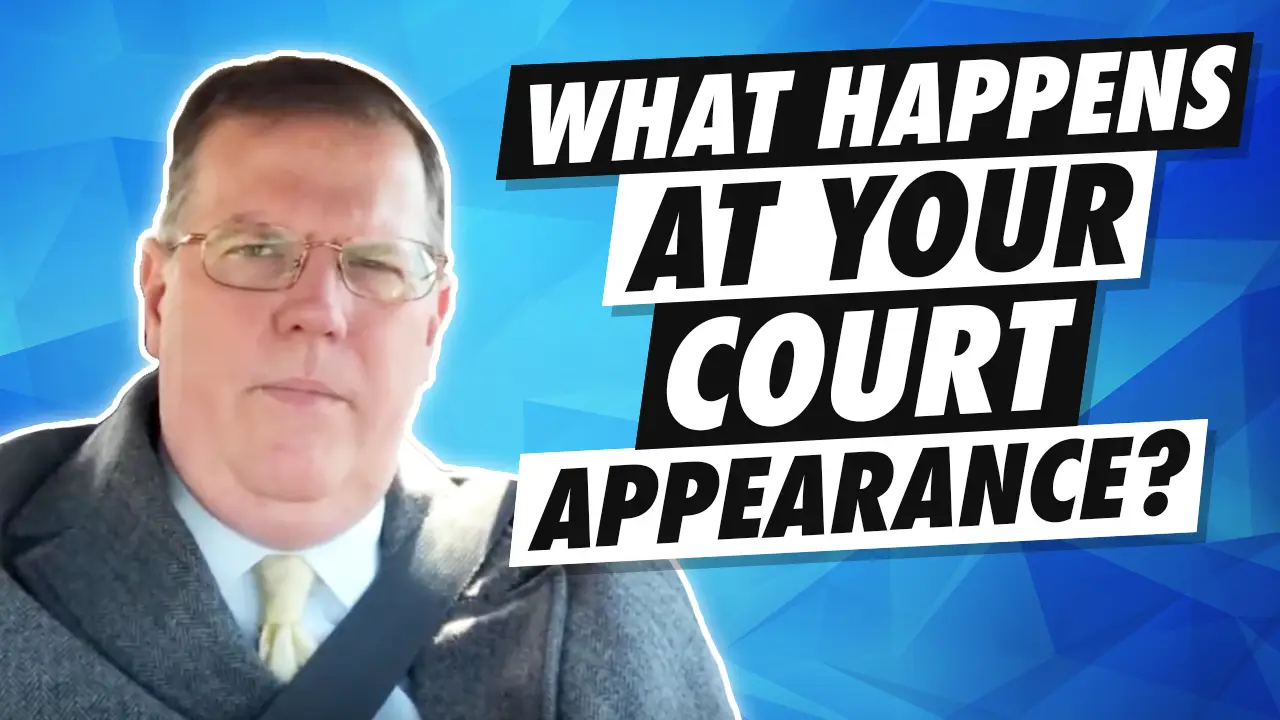
You’ve been arrested for a crime in Virginia and now you want to know what’s going to happen next.
Hi, I’m Northern Virginia Criminal Defense attorney, Scott Nolan. I’m here to talk to you about arrangements and preliminary hearings, what they are and what happens.
Court Arraignment
When you’ve been arrested for a crime, and then released by the police, your first court date is going to be something called an arraignment. The arraignment is nothing more than the court officially telling you what you already know that you’ve been charged with a crime. They’ll tell you the exact name of the crime and they will set a court date. What they won’t do is ask for your plea. They won’t ask you to plead guilty or not guilty or provide an explanation. While you definitely have to go to the arraignment, you don’t have to be worried, not a lot happens there.
The most important thing that really does happen there is the setting of the court date. That’s the reason why if you’re going to hire an attorney, you really want to hire the attorney before the arraignment. That way, the attorney can take his or her calendar to the court, and the attorney in the court can work out a court date that works for everybody. Otherwise, the court is just going to give you the very next court date available without regard to the attorney and then your attorney is going to have to play catch up by seeking a continuance.
Preliminary Hearings in Virginia
Much more important than an arraignment is a preliminary hearing. In Virginia, preliminary hearings only occur when the charge or at least one of the charges is a felony. If there’s no felony, then your next court appointment will be your trial. We’re not going to talk about that in this video; we are however going to speak about preliminary hearings.
The Official and Unofficial Purposes of a Preliminary Hearing
Two things really go on at a preliminary hearing, a lot of things but two important things. I like to say that there’s one official set of things going on and one unofficial set of things going on. Officially, your attorney and the prosecution are going to decide whether or not the prosecution needs to put on a preliminary hearing. That is whether they need to present to the judge of the lower court sufficient evidence to prove that the case ought to go before a judge of the upper court. The prosecution does not have to prove that you’re guilty. They don’t have to introduce all the evidence. They don’t even have to tell you all the evidence. They simply have to provide enough evidence to suggest that you should probably be tried by the upper court, the circuit court. The thing that is more important because it resolves about 90 percent of all cases, is the fact that the prosecution and your attorney are going to sit down and discuss the case. Even though the prosecutor doesn’t have to produce all their evidence, they have a big incentive to at least convince your attorney that they have a good case.
Plea Bargains and Decision-Making Power
In the American criminal justice system, nearly 90% of all criminal cases never go to trial because the prosecution and the defense agreed to a plea bargain. Enough evidence is presented that the prosecutor convinces the defense attorney that his client would be better off taking a deal than going to trial. The choice of whether to take the deal and whether to go to trial is not the attorneys, it’s yours, the defendant’s. Your attorney will not tell you what you should do. I hear that a lot. “Oh, my attorney told me to take this plea.” No good attorney will ever tell you to take a plea. Good attorney will listen to the evidence, tell you what he or she thinks about the evidence and then suggests a course of action. If your attorney ever tells you to take a deal or not take a deal, get yourself a new attorney.
Understanding Your Attorney’s Role
Many, many people think they have a bad attorney and that attorney suggests striking the deal with the prosecution, that really radically misunderstands what an attorney’s job is. An attorney’s job is not to tell you what you want to hear or to wave a magic wand and make your problems go away. The attorneys job is to professionally assess whether the evidence against you is any good, and if so, what would be the best possible result? You get to make the choice; if you don’t want the deal, just say so. Your attorney will say okay, and proceed.
If the two sides do come to an agreement, the prosecutor offers something could be a lesser punishment. It could be a lesser offense; it could be fewer offenses. But once the prosecutor offers you something and you accept it, then the case will go back in front of the judge. And the judge will be told there’s no need for a preliminary hearing, and that the two sides have an agreement. From there, it might be resolved right in that court. If the agreement is two misdemeanors, or if the agreement still retains felonies, then the case will ascend up to the upper court, Circuit Court. Your attorney might then ask you to waive your right to a preliminary hearing. Never, ever, ever waive that right unless you are satisfied with the deal that your prosecutor and attorney have worked out in exchange for that waiver. It’s an important right. If you’re not certain, then don’t take the deal. However, your attorney should be experienced enough to know and give you good advice so be sure to listen to your attorney.
If No Deal is Reached
On the other hand, suppose that the two attorneys discuss and they simply don’t agree or you don’t agree, the attorney might agree with the prosecutor and you don’t. Either way, there’s no deal and you’re going to a preliminary hearing. So what is that? Well, if you’ve never seen one and you’ve just seen TV or movies, you might think that a preliminary hearing is a lot like a trial; and it is a lot like a trial, but with some important differences. The most important difference is you can’t be found guilty because that’s not what’s going on there. The judge who is hearing a preliminary hearing is not deciding whether you’re guilty or innocent, only whether there’s enough evidence to have a trial. That is they’re looking for something lawyers called probable cause. The judge gets to decide on each count against you whether there is any probable cause. That doesn’t mean that they think you’re guilty or they think you’ll be found guilty. It’s just you’ve reached a bare minimum amount of evidence that we ought to have a trial to decide this.
At that preliminary hearing, only the prosecution generally will give evidence. The prosecutor will put on one or more witnesses to establish the evidence for the judge. It will not be all the witnesses that will appear at your trial and it won’t be all the evidence, just enough to convince the judge that there’s probable cause.
Why the Defense Rarely Presents Evidence
One thing that might surprise you is that your own attorney is probably not going to put on any evidence. I try never to put on evidence out a preliminary hearing. The defense is not required to put on evidence at a preliminary hearing, and it doesn’t do you any good in almost any case. One of the things the judge does not do is decide the value of the evidence itself. The judge only decides if this piece of evidence work to be believed. Is that sufficient evidence to have a trial.
The Judge’s Decision
Generally, only the prosecutor is going to put on any evidence. At the end of the preliminary hearing, the judge will not decide if you’re innocent or guilty. The judge will not give a sentence. The judge will simply decide whether to certify the case to the circuit court. That means the judge has decided there should be a trial or to refuse to certify the case. That’s much rarer. It is pretty difficult for the prosecution to lose a preliminary hearing. It happens, but not very often. Do not be dismayed. If you feel like you’ve lost the preliminary hearing, getting the case sent to the circuit court really has very little bearing on whether you’re going to win the trial or not. The most important thing you as the defendant should take away from any preliminary hearing is to listen to the evidence that’s given against you. Listen to the advice of your attorney, and then decide for yourself whether or not going forward with a trial is a good idea.
After your preliminary hearing, after you’ve turned down the deal of the prosecutor, and you’ve gone to a preliminary hearing, your attorney generally can still talk to the prosecutor. If you’ve changed your ind. Don’t be afraid to do that, but always take time to think about what’s in your best interest. All right, folks, that’s it for me. If you’d like to talk about preliminary hearings, arraignments, or any other part of the legal process, contact my office today. I handle these cases every day and can give you clear, honest guidance on your options.



